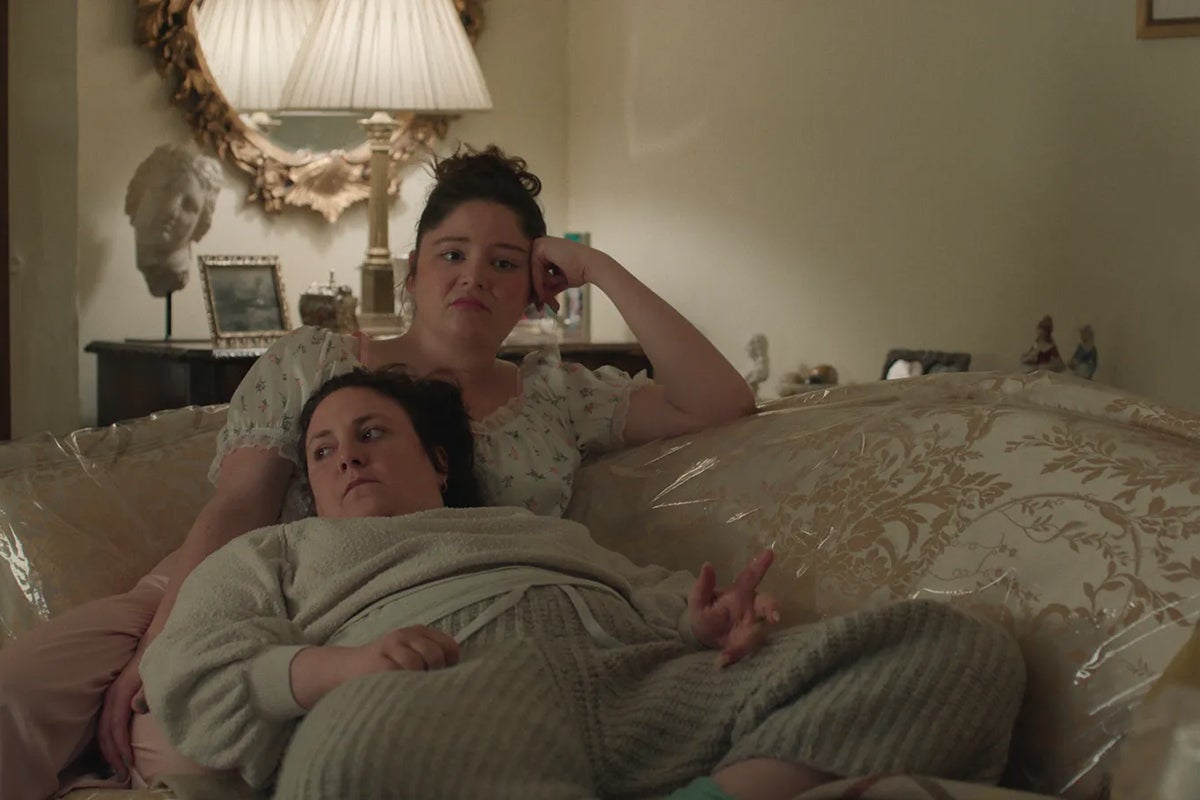There are four Jewish moms in Lena Dunham’s new show, “Too Much.”
The series stars Megan Stalter as Jessica Salmon, who moves to London and meets her (maybe) bashert, musician Felix Remen (Will Sharpe). And while I love their red flag-filled romance, I want to take a moment to pay tribute to the way the show tackles the portrayal of Jewish mothers.
These women aren’t made to be revered; they’re as much of a complex mess as all the characters in the show, vacillating between likeable and extremely unlikeable. But they also don’t neatly fit into the age-old trope of the overbearing Jewish mother — at least, the ones that actually show up on the screen don’t, instead glowing in their full, messy, technicolor glory.
There’s Jess’s sister Nora, played by Dunham herself; Nora and Jessica’s widowed free spirit mother, Lois (Rita Wilson); and their grandmother, Dottie, a regal-looking widow played by Rhea Perlman.
Dottie is the one who owns the Long Island home where her daughter and granddaughters find refuge. When we meet first meet Jess she’s hermitting in the Judaica-tchotchke-filled Grey Gardens situation, watching British romance films with Nora, Lois and Dottie. Immediately, the family’s closeness is apparent. These women are looking out for one another.
While both Lois and Dottie have some qualities that are part of the exhausting Jewish mother stereotype — they’re critical, and they snipe at Jess about her waistline and her “broken picker” — they’re also vibrant, fully fledged women.
Dottie, whose sense of fashion and personality seem to be inspired by Dunham’s grandmother, Dorothy Simmons, is a pure delight. She might be my favorite character in the show. We all know a Dottie: white hear always perfectly curled, face always made up, outfit always the best in the room (even when you’re just watching TV), brooches always oh-so-quaint, couches always covered in nylon, menorahs always on display. I love the way she candidly talks anything with her granddaughter Jess, from pain in her “poon poon” to her dating woes. Lois tells Jess that, like many children of her generation, she was never “mothered” by Dottie, but Dottie shows up fully for her granddaughter, and for herself.
Wilson’s Lois is not really the paragon of a warm and nurturing maternal figure either. She can be very sharp, critical and my-way-or-the-highway when it comes to her daughters — but we see through the episodes that she takes that energy and uses it in her whole life. She cares deeply for her children, but she’s also willing to prioritize some of her own needs.
Then there’s Nora, the youngest of the lot, dealing with a funk after her husband James (Andrew Rannells) left her to experiment with pansexuality in Bushwick. “Too Much” doesn’t lean into the “girl boss” mentality, and both Nora and Jess are working women who don’t make their work the center of their lives — it’s refreshing to watch. And while Nora is wounded when it comes to her marriage, and living the way less glamorous life since her split, she’s also not willing to give up her pride. Her ex, James, is clearly still smitten with her and her spirit; who wouldn’t be?
The last Jewish mother of “Too Much” is one we never get to meet, and she doesn’t get quite the same multi-dimensional treatment as the other three Jewish moms do.
The fourth Jewish mother in “Too Much” is Sharon, Zev’s mom. Zev, Jess’s Not-So-Nice Jewish Boy ex, is absolutely presented as a villain in the show (and is played by Michael Zegen of “The Marvelous Mrs. Maisel”). In the eighth episode, we witness him at therapy, sharing what he thinks is his “primal wound.” Spoiler: It’s Sharon.
She was was too nurturing, Zev says, too overbearing, always there with a blanket he didn’t need, washing his shirt, tucking his pants. It’s her fault he didn’t know how to turn on a washing machine until he was 19. The price he paid for her constant care was that he had to tell her that he loved her best of all, at all times, and that no one could compare. Sharon, Zev seems to claim, is the reason he is the way he is. Which is to say: A jerk.
Zev may or may not be right in his assessment about his mother, but I personally like thinking of him as a Philip Roth-ian type. He blames all of his ills on the Jewish women in his life — painting them as “too much” — and never takes responsibility for how his actions — him stifling and diminishing his girlfriends, his own ego trips, his deceptive behavior — might be what gets in between him and happiness.
I wish I could have viewed Sharon on my screen, because something tells me that she’s so much more than the stereotype her son paints her as. The writing in “Too Much” does so much justice for its Jewish mothers, eschewing the stereotypical, suffocating “Jewish Mom” trope that so many other TV shows and movies keep coming back to. The care with which this show treats its Jewish mothers allows me to imagine the best, most complicated and interesting version of Sharon. She does not have to be flattened into her son’s perception of her.
What I love most of all about the Jewish mothers of the Salmon family is how they all find comfort and support in each other. They may not always have the perfect words to say, but they’re there for each other when they need to be and there’s no indication that they are suffocating each other or causing their offspring to want to escape their grasps.
Are they the perfect mothers? Absolutely not. But do they keep coming back to that lovely cocoon of togetherness, watching rom coms, kvetching and kvelling and noshing on plastic-protected vintage couches? Yes, absolutely. And as a Jewish mother who is lucky enough to have her own little cohort of complicated, multifaceted, supportive Jewish mothers, I can tell you — there’s no better place to be.








